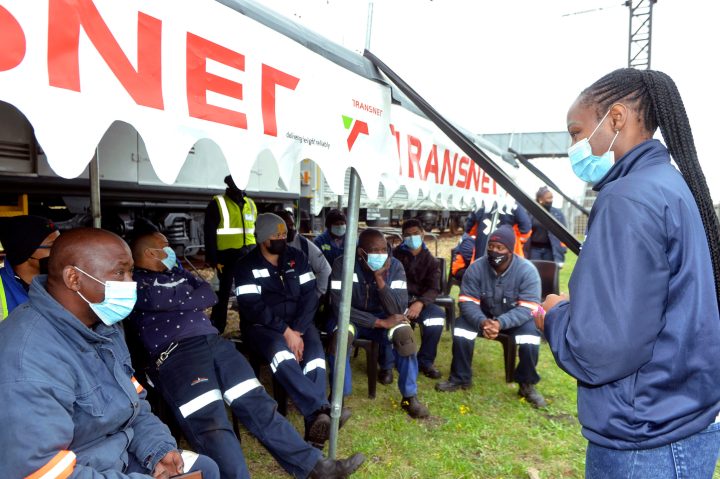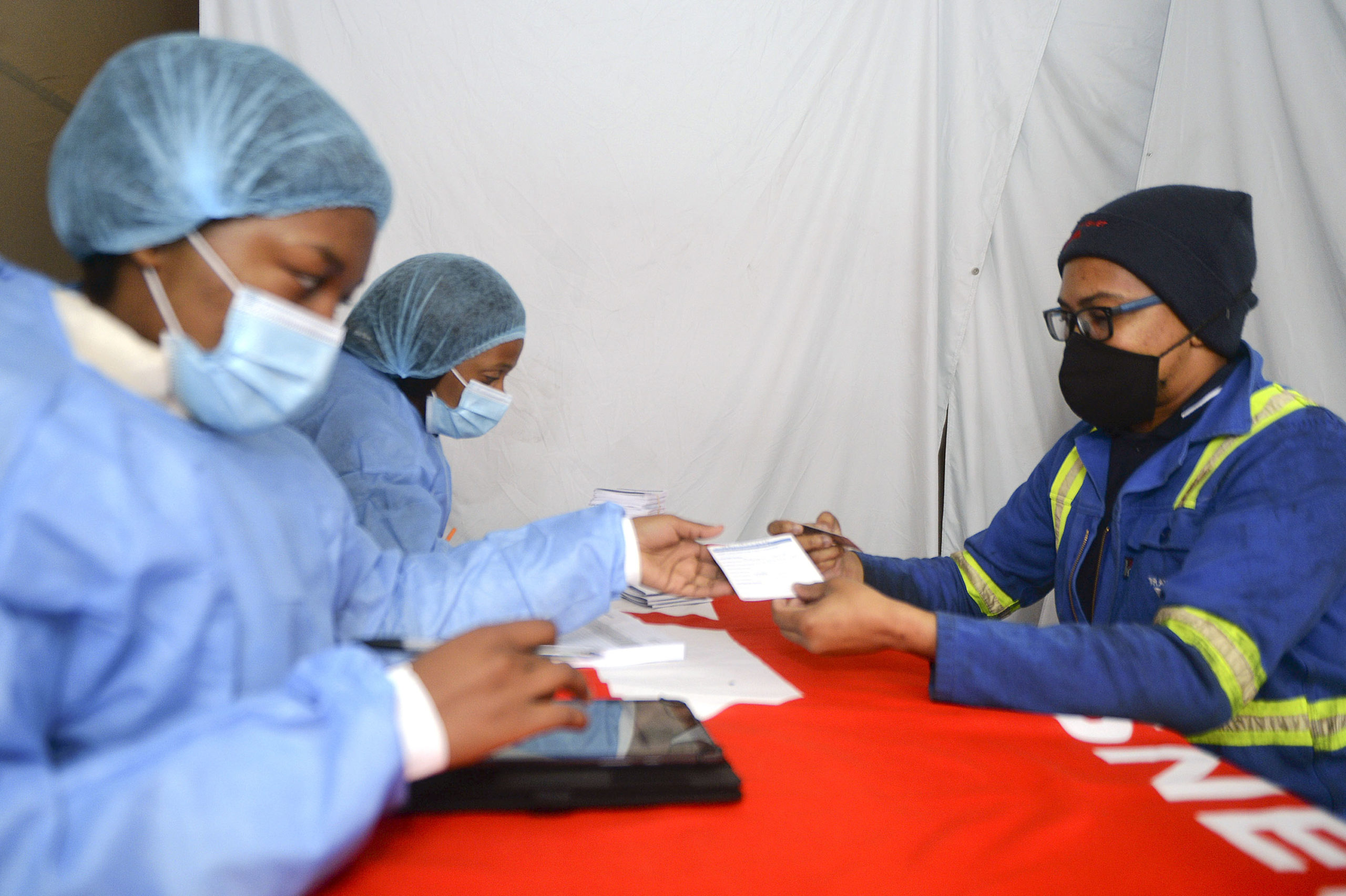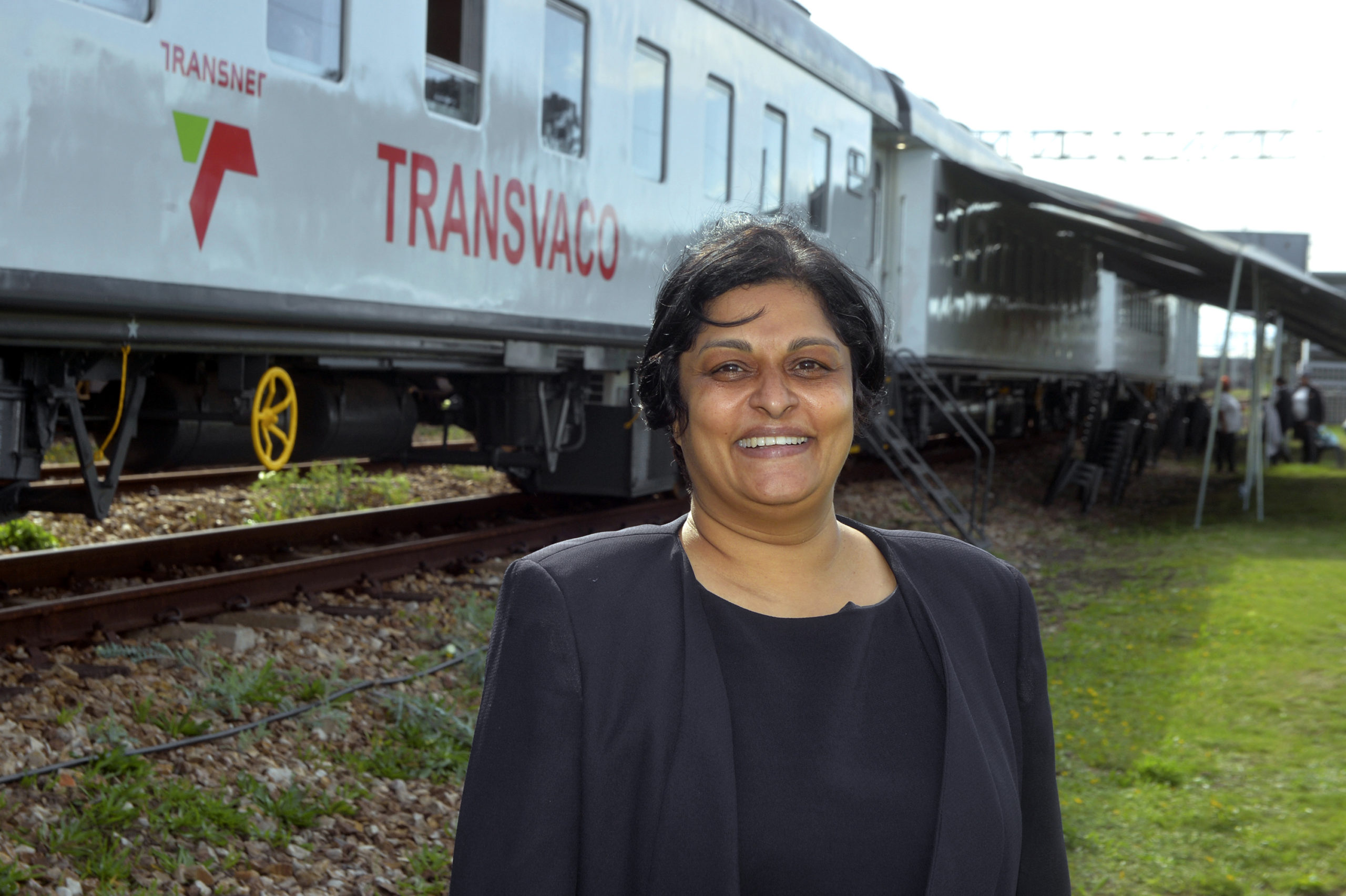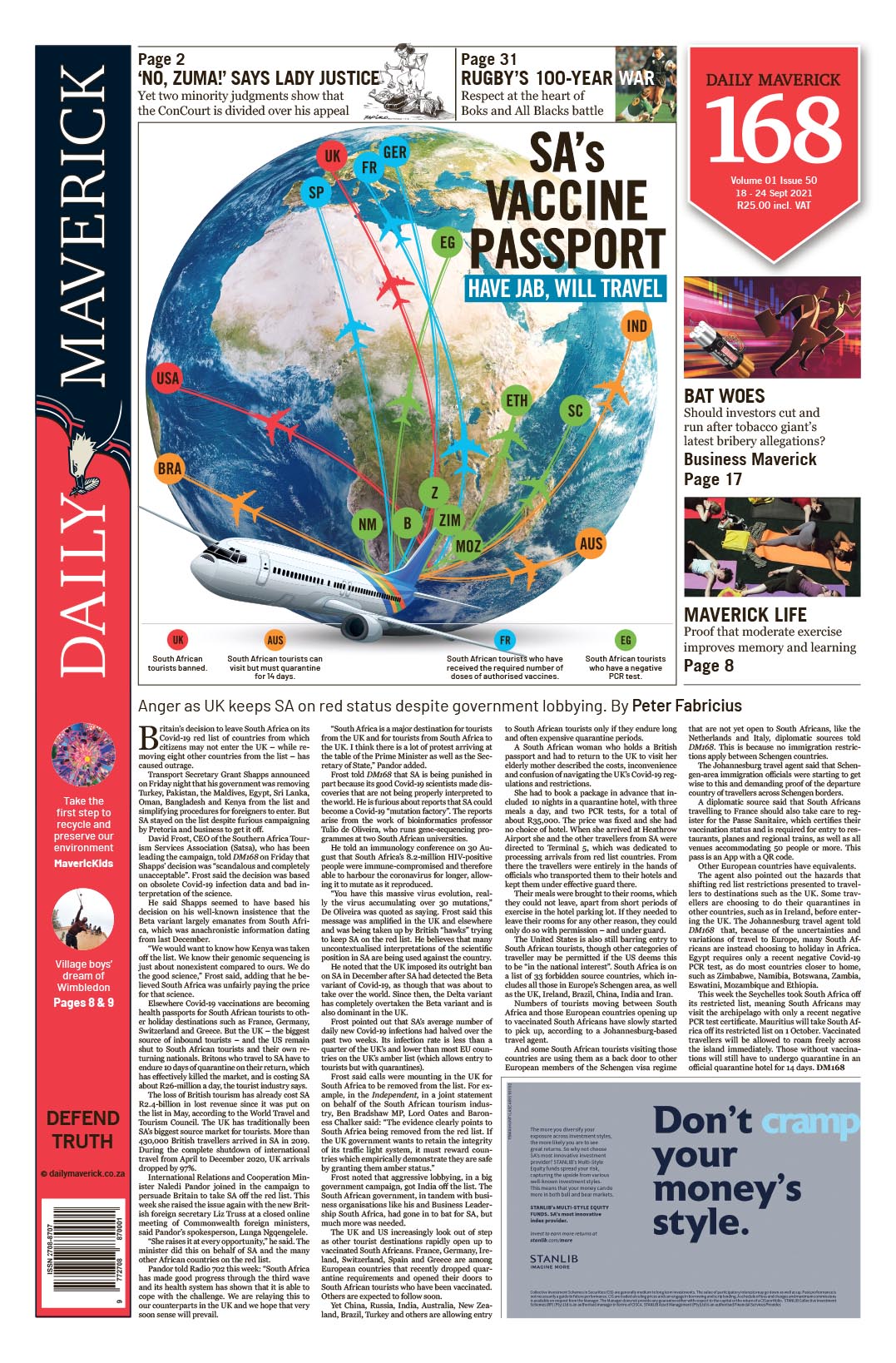DM168 INSPIRATION
The Covid-19 vaccination train rolls into town

It’s ‘All aboard!’ as a moving inoculation station takes vaccinations and information to the people.
First published in the Daily Maverick 168 weekly newspaper.
Transnet’s first vaccine train made its inaugural stop at the Swartkops Station in Gqeberha this week. The train is as South African as the dishes planned by the resident catering manager, Oom Colin Boucher, with his Kook en Geniet on the shelf in his office, the well-known Springbok logo on the doors, the many languages spoken in the dining car and the security personnel protecting the facility with their dog-eared forms on clipboards.
Built in four months by Transnet’s engineers, the train has a pharmacy with state-of-the-art freezers that can accommodate the low temperature required for the Pfizer vaccine, and a tent for those who can’t make it up the stairs – as well as a whole lot of love and some tough talk for those who are not sure about vaccination. It comes complete with a security car, a converted railway police car, which still has a little jail.
“But we use it for storage,” laughed Shamona Kandia, the Transvaco project manager.
“It was like I was shopping for renovations for my home,” Kandia said, as the building team brought her samples of tables and taps to choose from.
After a competition among Transnet workers, the train was named Transvaco. “It stands for Transnet Vaccine Coaches.”
Kandia started off as a social worker but after stints at an NGO and the Department of Social Development in Gauteng, she joined the Transnet Foundation.
“I wanted to pursue community development. My heart is with people. It is my passion, my drive and my energy, and now I find myself on a train of all places,” she laughed, as she described her journey from having a plan for a vaccination train to seeing the Transvaco roll into the Swartkops Station.
“You hear a lot of other things about Transnet in the news, but this, this is the true Transnet. What you see here today … the people, the energy, the willingness … it is that feeling of making a difference.”
Lunch service was wrapping up in the dining car and across the way two of South Africa’s soccer legends, Fani Madida and Linda Buthelezi, were finishing their lunch, taking a break from their advocacy work.
“They have a powerful presence and voice, two of our soccer legends of South Africa. Men listen to them. The message they have is simple: we have to protect our loved ones. That is what this vaccine train is all about,” Kandia said. “We had to convince them first. We thought, let’s understand where this reluctance comes from. But now that Linda and Fani are here, they know what to say. Their voices are powerful and they are on the case of those who are not vaccinated.
“The train was here on Sunday morning with nothing in place. Just a wing and a prayer. We knew we were on rail – that was about it. But we have people. They said there will be an event. I said yes, the event is us serving our people. They said there will be an event … I said you will have to come find us along the way. We are setting up. Our mandate is to do vaccines, to increase the uptake of vaccines, to do vaccine advocacy.”

Noluvuyo Coka-Magasana (left) receives her vaccine from Bongani Nxumalo on 14 September 2021. (Photo: Deon Ferreira)
The train was launched by Health MEC Nomakhosazana Meth on 14 September.
“We have a whole programme that is built and hinged on education and awareness. To demystify what vaccines are all about, to speak the truth about vaccines being lifesaving,” Kandia said.
“This train is proudly South African. It is the first of its kind on the African continent. We wanted something functional, that goes out there and does the work it is supposed to. A simple, effective solution.”
People who want to be vaccinated can do everything from registration to vaccination on the train, but they can also just talk.
“Educators take the time to comfort them,” Kandia said. “We have nurses who ask: what are you afraid of, what is your fear? They will tell us, ‘We have heard the vaccine puts a chip in you.’
“People leave here comforted. We send them away protected,” she said.
Kandia has diabetes and is a cancer survivor, but got the vaccine as soon as she could.
“I encourage people,” she said. “We brought in experts to teach us and then wherever we go we can now teach others. This is a case of each one teaches one.”
The train travels with a core staff of seven or eight people and security personnel but recruits local unemployed people at its stops.
“We try to bring relief wherever we go. We have unemployed nurses and a huge contingent of unemployed youth in South Africa. Wherever we go we recruit from the local environment.”
Those who travel with the train include the head of the vaccination programme, the lead pharmacist, the catering and hospitality manager, and the logistics and technical staff as well as two data capturers. “It takes us 15 minutes from start to finish to do a vaccine. Our vaccinators have it down to a fine art. Then you must wait for 20 minutes so we are sure that you are not having an adverse reaction,” she explained. “But we discourage people from loitering. We don’t want this to become a superspreader event.”

From left: Masibonte Karoaga, Asandisawa Fubesi and Thobelani Stock get down to business on the vaccination train on 14 September 2021. (Photo: Deon Ferreira)
The train is equipped with lifesaving emergency equipment that can be used in case of a severe anaphylactic reaction to the vaccine.
“It is going to be a long journey,” Kandia said. “We are starting with seven communities in the Eastern Cape [and] we are not just parking at the station.
“We work in a 70km radius around the train. We want to make sure that vaccines are accessible to communities.”
As she speaks, the vaccinators get ready for a police shift to come for their vaccines and military personnel who have not yet been vaccinated to come for their jabs.
“Today we are vaccinating at 6pm,” she said. “Many people work shifts and we want to make sure that we reach them too.”
She said they were also paying special attention to young people.
“I have a 17-year-old and a 21-year-old. They see Covid-19 happening but I don’t think they have internalised the message – like many of our youth today. On Saturday we drove towards one of the informal settlements [in Gqeberha] – we saw it from the plane when we landed and decided we must work there. As we drove we saw large congregations of youth without masks. We stopped and we started asking questions and engaging. There is Covid-19 fatigue. Covid has been the hardest on these kids because it has changed their lifestyle. The world they knew is suddenly gone.
“We want people to understand that it is okay to be afraid and okay not to want to confront the reality but you have to understand the dangers to yourself and how you are contributing to the bigger picture. We engage the kids. We say these are the choices. There is nothing else. What do you choose? When you have a difficult conversation but in a comfortable way – and they know they have a role to play in their own decision-making process – that is the winning recipe, I think.
“We understand how different age cohorts view vaccines. Even health workers … are uncertain. We have lost so many people and we are going to lose more unless we do something drastically different,” she said.
“I am very proud of our country. I am proud to be South African. If I go to the shops and hear a conversation about vaccines, I go and immerse myself in that conversation. I do because I feel a sense that we are all South Africans. We must knuckle down and do the right thing at the right time with the right people,” she said. DM168
This story first appeared in our weekly Daily Maverick 168 newspaper which is available for R25 at Pick n Pay, Exclusive Books and airport bookstores. For your nearest stockist, please click here.
"Information pertaining to Covid-19, vaccines, how to control the spread of the virus and potential treatments is ever-changing. Under the South African Disaster Management Act Regulation 11(5)(c) it is prohibited to publish information through any medium with the intention to deceive people on government measures to address COVID-19. We are therefore disabling the comment section on this article in order to protect both the commenting member and ourselves from potential liability. Should you have additional information that you think we should know, please email [email protected]"





 Become an Insider
Become an Insider